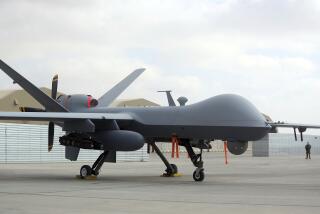Bush Warns Serbia Against Escalation : Balkans: Administration hints at U.S. intervention if ethnic fighting spreads to the province of Kosovo.
- Share via
WASHINGTON — The Bush Administration warned Serbia on Monday against widening the conflict in Bosnia and hinted that the United States is ready to use military force if Belgrade provokes new fighting in Kosovo, the Serbian province that is inhabited mainly by ethnic Albanians.
Administration officials essentially confirmed that President Bush formally warned Serbian President Slobodan Milosevic in a letter last week that in case of such an escalation, U.S. military force would be aimed against Serbian troops in Kosovo and in Serbia itself.
Bush apparently also served notice that he is willing to use U.S. troops to protect members of U.N. peacekeeping forces in Bosnia if the Security Council should vote to step up enforcement of the “no-fly zone” that it imposed over Bosnia earlier this year.
The developments came as, separately, U.N. Secretary General Boutros Boutros-Ghali met in Geneva with representatives of the Yugoslav, Bosnian and Croatian governments but apparently made no progress in working out a diplomatic solution to the bloody Balkan warfare.
American officials cautioned that Bush’s letter to the Serbs was intended only to signal America’s willingness to use U.S. forces to back U.N.-sanctioned military operations; it did not imply that Washington was preparing to take action on its own without allied support.
Nevertheless, the new presidential warning marks a further hardening of the Administration’s position on the Bosnian conflict. It is expected to intensify pressure on all sides to come up with some sort of solution to the current situation.
The White House is especially worried about the possible spread of fighting into Kosovo because the province, while technically Serbian, is populated mainly by ethnic Albanians. Officials fear a conflict there could set off a chain reaction in neighboring countries.
The U.S.-spurred effort to persuade the Security Council to authorize military action to enforce the no-fly restrictions has stalled, in part because of fears by the British and French that the Serbs might retaliate by attacking their peacekeeping units.
Diplomats said the three Western powers and Russia continue to be sharply split over such key issues as how long a warning period to give the Serbs and whether to bomb Serb-supported airports--which is likely to invite harsher retaliation--along with shooting down Serbian aircraft.
American officials continued to predict that the four big powers will narrow their differences soon, in time to pass an enforcement resolution sometime in early January. But diplomats said no major breakthroughs seem likely this week.
One possible compromise being discussed involves leaving it to military leaders of the North Atlantic Treaty Organization to decide how far to go in employing military power--a solution that would take big-power governments off the hook yet still pose a credible threat.
But American officials conceded that the United States is unlikely to win all the terms it is seeking--particularly its push to set a relatively short warning period that would permit military operations to begin almost immediately after the resolution is passed.
Meanwhile, Russia is said to be calling for a go-slow approach, partly because it is reluctant to jeopardize its traditional position as a close ally of the Serbs. The Belgians also reportedly are pressing for a less aggressive approach.
The American move also has lost momentum because the United Nations’ top two envoys in the Yugoslav peacekeeping effort, Cyrus R. Vance and Britain’s Lord Owen, have called on the Security Council to drop its push to toughen enforcement and give diplomatic efforts more of a chance.
But Washington feels under pressure in the wake of Milosevic’s apparent victory in the Serbian presidential elections earlier this month over challenger Milan Panic, a Yugoslav-born Southern California businessman. The United States blames Milosevic for most of the violence.
Secretary of State Lawrence S. Eagleburger had predicted a week ago that the enforcement resolution would be passed by the Security Council before Christmas, but representatives went home last weekend without reaching any agreement.
If the council resolution is passed, the allies have agreed that enforcement operations will be conducted by NATO and the Western European Union, the military arm of the European Community.
U.S. officials publicly skirted the contents of the Bush letter on Monday, contending they were unable to comment on presidential documents. The existence of the letter was reported Monday in the New York Times and confirmed by The Associated Press.
More to Read
Sign up for Essential California
The most important California stories and recommendations in your inbox every morning.
You may occasionally receive promotional content from the Los Angeles Times.













